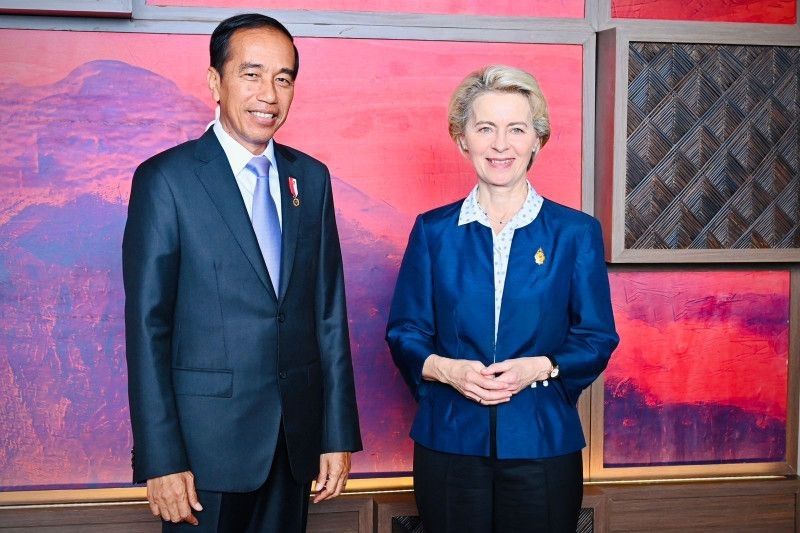Indonesia and The Dilemma of Unilateral Move on European Union’s Opportunities

Indonesian President Joko Widodo (left) and President of the European Commision Ursula von der Leyen (right). Foto: ANTARA News
By the need of triumph and retain Indonesia’s competitiveness in the Indo-Pacific region, Indonesia must maintain all endeavors for something like the success of the Indonesia-European Union Comprehensive Economic Partnership Agreement (IEU-CEPA). One tried-and-true method is to establish economic ties with nations or areas that are willing to invest in and import Indonesian produced goods among its traditional and non-traditional export partners. EU per say, as one of the leading regions in the global stage in terms like economy, research, and development. We can imagine that if Indonesia succeed the agreement, this could boost the perception on the nation’s competitiveness in the region and beyond.
ASEAN as a region consists several countries that thriving the world’s economic growth. Member countries like, Vietnam and the Philippines scored amazingly in terms of growth despite global slowdown. Indonesia should be aware on this situation. Fulfilling national’s interest can be done not only by unilateralistic way, but also multilateralistic means of diplomacy. Unilateral diplomacy may seems appealing on the first hand, but on the other hand, some loses may be appeared so it should be manage in need to the keep the order of global governance. It already proven that one country cannot survive by thriving alone in this networked and globalized world.
Moreover on competitiveness, as per Indonesia Investments (2022) data, based on the World Competitiveness Yearbook (WCY) (2022), Indonesia positioned itself on 44th place overall (out of 63), which is much lower than the previous year’s position (37th). This signifies that Indonesia dropped numerous points from the previous year. Indonesia must aggressively promote its competitiveness and strive to be the most appealing country for investment in the area. More competitive a country means more strive its economy. Indonesia needs to settle itself into a more advance way for growing its economy, and it also means to rejuvenate its partners. Not to be a hypocrite, we all know that the European Union members are mostly advance countries. Thus, if Indonesia decided to make the relationship with the European Union closer, actually it is beneficial move because Indonesia could learn better technologies and innovation for its own economy competitiveness.
Then, members of the European Union dominate the World Competitiveness Yearbook (2022). Denmark, Sweden, the Netherlands, Ireland, Luxembourg, Germany, Austria, and Belgium remain at the top of the list. As a result, Indonesia must act quickly to finish the IEU-CEPA in order to protect and safeguard its objective in increasing Indonesia’s economic competitiveness in the area.
According to the WCY analysis, Indonesia still lags below Singapore, Malaysia, and Thailand in terms of competitiveness. This occurrence is significant to instantly revitalize a debate as to why rivalry with other nations in the area, such as Vietnam and the Philippines that are expanding fast, should be acknowledged and not degraded by the ideology of “Unilateral Economic Diplomacy” as mentioned above, in this connected society, no countries can survive alone. For example, we see how countries in the world connect to each other in term of dealing the global pandemic of Covid-19. Even though countries closed its borders, as per immunity herd, countries help each others in terms of vaccination and medical equipment.
As ASEAN’s de facto largest country, Indonesia should persuade the EU to strengthen in order to secure Indonesia’s national geo-economic and geopolitical influence in the Indo-Pacific. Further, Indonesia, as a maritime country, could enhance its tactical commitment to the region through commerce and investment, including an update of its maritime interest in the Indo-Pacific, thanks to the prospect of technological and innovation advancements as outlined in the CEPA initiative with the EU.
Furthermore, as Segara (2022) stated, while the European Union’s commercial links with Indonesia have increased over time, they appear to have come to a halt. The EU was Indonesia’s fourth most important trading partner in 2021, with annual commerce in products valued at 24.7 billion EUR (24.84 billion USD). Then, the IEU-CEPA is intended to assist EU nations increase their investment in Indonesia. With such a push, a rather more sustainable economy and investment from EU member nations in Indonesia might be fascinating options for Indonesia to pursue as it strives to become a developed nation by 2045. Aside from that, the Indonesian government not just interested in economic recovery, but also in allowing the country’s economy to expand rapidly than prior to the epidemic, and the CEPA provides one of the most convenient ways to accomplish these goals.
Darynaufal Mulyaman is a lecturer at Universitas Kristen Indonesia and fellow researcher at Indonesian Institute of Advanced International Studies (INADIS)





